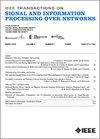CoRNI: A Co-Evolutionary Framework Integrating Reputation and Network Structure for Modeling Social Influence Dynamics
IF 3
3区 计算机科学
Q2 ENGINEERING, ELECTRICAL & ELECTRONIC
IEEE Transactions on Signal and Information Processing over Networks
Pub Date : 2025-03-28
DOI:10.1109/TSIPN.2025.3572295
引用次数: 0
Abstract
The prevalence of Internet platforms, such as social media and web pages, enables users to share their opinions and observe each other's actions. Users may show strong advocacy and support for each other's opinions and decisions at one moment, while they may disagree with each other with polarized views later. These dynamic changes of supportive relationships pose challenges to influential entities such as government agencies, firms, politicians, experts and weblebrities, who aim to gain support from and have large influence on the public. To study this dynamics, we consider the Social Networks with Supportive Relationships (SN-SR), whose links represent actively supportive relationships and are disconnected when users disagree with each other. For these influential entities, their reputation and social influence impact each other's evolution over SN-SR, while few works study how to model this co-evolving pattern and how to analyze and predict the dynamics of their influence over networks. In this work, we use the network topology of the SN-SR as an intermediate variable to model and study the interplay between the reputation and influence, and propose an integrated framework called CoRNI to theoretically analyze its impact on social influence. We use simulations on synthetic networks and real Weibo data to validate our proposed model and theoretical analysis. This investigation provides important guidelines for influential entities to adjust their actions and improve their influence over the network.一个整合声誉和网络结构的社会影响动力学模型的协同进化框架
社交媒体、网页等互联网平台的普及,使得用户可以分享自己的观点,并观察彼此的行为。用户可能会在某一时刻对彼此的观点和决定表现出强烈的拥护和支持,而随后他们可能会以两极分化的观点反对对方。这些支持关系的动态变化对政府机构、公司、政治家、专家和网络名人等有影响力的实体构成了挑战,这些实体旨在获得公众的支持并对公众产生重大影响。为了研究这种动态,我们考虑了具有支持关系的社交网络(SN-SR),其链接代表积极的支持关系,并且当用户彼此不同意时断开。对于这些有影响力的实体来说,它们的声誉和社会影响力相互影响着彼此在社交网络上的进化,而很少有研究如何对这种共同进化模式进行建模,以及如何分析和预测它们在网络上的影响力动态。在这项工作中,我们使用网络拓扑结构作为中间变量来建模和研究声誉与影响力之间的相互作用,并提出了一个称为CoRNI的集成框架,从理论上分析其对社会影响力的影响。我们利用合成网络和真实微博数据进行了仿真,验证了我们提出的模型和理论分析。该研究为有影响力的实体调整其行为并提高其在网络中的影响力提供了重要指导。
本文章由计算机程序翻译,如有差异,请以英文原文为准。
求助全文
约1分钟内获得全文
求助全文
来源期刊

IEEE Transactions on Signal and Information Processing over Networks
Computer Science-Computer Networks and Communications
CiteScore
5.80
自引率
12.50%
发文量
56
期刊介绍:
The IEEE Transactions on Signal and Information Processing over Networks publishes high-quality papers that extend the classical notions of processing of signals defined over vector spaces (e.g. time and space) to processing of signals and information (data) defined over networks, potentially dynamically varying. In signal processing over networks, the topology of the network may define structural relationships in the data, or may constrain processing of the data. Topics include distributed algorithms for filtering, detection, estimation, adaptation and learning, model selection, data fusion, and diffusion or evolution of information over such networks, and applications of distributed signal processing.
 求助内容:
求助内容: 应助结果提醒方式:
应助结果提醒方式:


